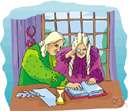There were law students who read "Noctes Ambrosianae," the '
Age of Reason', and Bailey's "Festus," as well as Blackstone's 'Commentaries;' and there was a public library in that village of six hundred people, small but very well selected, which was kept in one of the lawyers' offices, and was free to all.
"You see, then," continued the king, "if I have such remembrances of my childhood, what an amount I may gather in the
age of reason."
They were men of the
age of Reason; they, who filled their gardens with these stone nymphs, had less hope than any men in all history of really meeting a nymph in the forest."
Timothy was a wiry old laborer, of a type lingering in those times-- who had his savings in a stocking-foot, lived in a lone cottage, and was not to be wrought on by any oratory, having as little of the feudal spirit, and believing as little, as if he had not been totally unacquainted with the
Age of Reason and the Rights of Man.
For one thing, the eighteenth century was the
Age of Reason, the Age of Enlightenment, and people simply would not have countenanced such hectic, foolhardy playing; for another, there probably wasn't a house band in Germany masterly enough to have accomplished the deed.
They even welcomed an uncertain danger, tired as they were of the "
Age of Reason." Such titles--their very length mimics the notion of profligate, irrational vegetative growth common to orientalist fantasy--give literary expression to an ambiguity that emerges just as dearly in the formal nuances of the sculpture, in which organic and synthetic, Eastern and Western mix promiscuously.
In highlighting Paine's often opportunistic recourse to biblical language and allusions, the author provides further evidence of the force of religion in the"
Age of Reason." But was Paine's homiletic style (a much overused term in this slim volume) more than a pragmatic, rhetorical device?
During the
Age of Reason, such tales were discounted and dismissed by men of science.
Cultural manifestations of this privileged inner voice are as varied as Hutchinson's challenge to Puritan orthodoxy, <IR> THOMAS PAINE </IR> 's claim in <IR> THE
AGE OF REASON </IR> that "my own mind is my own church," to the acts and beliefs of early literary characters such as Theodore Wieland in <IR> WIELAND </IR> (who murders his family at the prompting of divine voices he believes he hears), Hester Prynne's claim in <IR> THE SCARLET LETTER </IR> that what she and Dimmesdale did had "a sanctification of its own," to the critical commonplace that American literature itself is antinomian.
Among his works are The Case of the Officers of Excise (1772), a plea for higher wages to excisemen, of whom he had been one; Common Sense; The American Crisis, a series of pamphlets supporting the American Revolution; Public Good (1780), in which he urged that western lands become the property not of one colony but of the nation; Dissertations on First - Principles of Government (1795), an attack on monetary inflation in the American colonies; The Rights of Man; and The
Age of Reason, for which he was denounced as an atheist.
At times Postman comes off like an apostle of the
Age of Reason, inveighing against the vagaries of modernity.
War and Peace in the Western Political Imagination: From Classical Antiquity to the
Age of Reason
 Age of Reason - a movement in Europe from about 1650 until 1800 that advocated the use of reason and individualism instead of tradition and established doctrine; "the Enlightenment brought about many humanitarian reforms"
Age of Reason - a movement in Europe from about 1650 until 1800 that advocated the use of reason and individualism instead of tradition and established doctrine; "the Enlightenment brought about many humanitarian reforms"